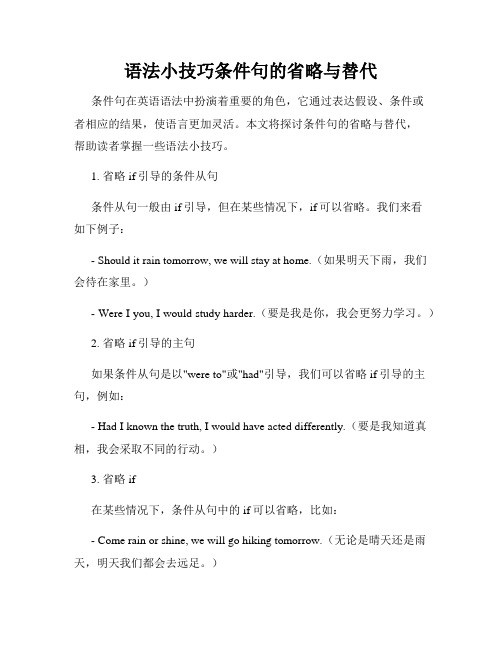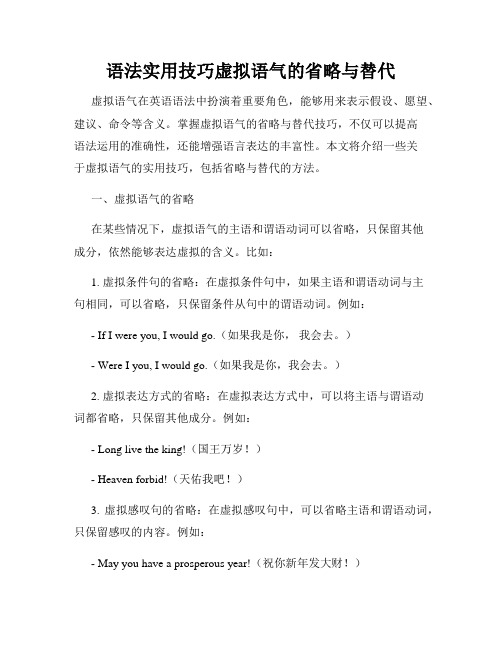实用英语语法教程省略与替代
英语语法讲解省略及替代

⑤— I would never come to this
restaurant again. The foo2004)
A. Nor am I
B. Neither would I
C. Same with me D. So do I
⑥I will never know what was on his
一、考查不定式结构中的省略
⑶ 当两个或多个不定式并列时后面的不 定式符号to可以省,但有对比关系时不 能省 It’s easier to make a plan than to carry it out. ⑷ 不定式在see /watch /notice /hear /listen to /look at /feel /have /make /let /observe 等 有作宾语补足语时 (5) “why do sth.?”结构中不定式不带to
(NMET1995)
A. not to
B. not to do
C. not do it
D. do not to
⑤—I’ll be away on a business trip. Would you mind look after my cat? —Not at all. _____. (NMET1995) A. I’ve no time B. I’d rather not C. I’d like it D. I’d be happy to
B. I’d like to, but I have an exam tomorrow
C. No, I won’t D. That’s right
④The boy wanted to ride his bicycle in the
street, but his mother told him _____.
语法实用技巧宾语从句的省略与替代

语法实用技巧宾语从句的省略与替代语法实用技巧:宾语从句的省略与替代宾语从句是英语中常见的句子结构,它通过引导词(如that、whether、if等)将一个句子嵌入到另一个句子中,并充当主句的宾语。
在日常交流和写作中,我们常常遇到需要使用宾语从句的情况,但有时候句子过长或内容琐碎,为了简化句子结构,我们可以使用宾语从句的省略与替代技巧。
本文将介绍一些实用的技巧以及适用的情境。
一. 宾语从句的省略技巧1. 省略引导词“that”在口语和非正式写作中,我们通常可以省略宾语从句中的引导词“that”,如:- I believe (that) he is telling the truth.(我相信他在说真话。
)- She said (that) she would come to the party.(她说她会来这个派对。
)需要注意的是,当宾语从句中的主语与主句的主语不一致时,不可以省略引导词“that”,如:- I know (that) he is coming.(我知道他要来。
)- She believes (that) they are innocent.(她相信他们是无辜的。
)2. 省略全部宾语从句当主句的谓语动词与宾语从句的谓语动词相同且宾语从句的主语与主句的宾语相同时,可将整个宾语从句省略,如:- She promised to come, and she did.(她答应过来,她来了。
)- He said he wanted to resign, and he did.(他说他想辞职,他确实辞职了。
)二. 宾语从句的替代技巧1. 使用“so / not to”当宾语从句是一个目的状语从句时,我们可以使用“so as to”或“not to”来替代宾语从句,如:- She studied hard so as to pass the exam.(她努力学习以通过考试。
)- He walked quietly, so as not to wake up the baby.(他小心翼翼地走,不想吵醒婴儿。
替代与省略

替代与省略替代和省略是语言中常见的现象,用于简化表达或避免重复。
下面是一些常见的替代和省略方式:1. 代词替代:使用代词来替代先前提到的名词,以避免重复。
例:John is my friend. He is very kind.(约翰是我的朋友。
他非常友善。
)2. 动词省略:在一些情况下,可以省略主语后面的谓语动词,因为主语已经明确。
例:She sings well, and he does too.(她唱得很好,他也是。
)3. 助动词省略:在一些情况下,可以省略助动词,因为上下文已经明确。
例:I can play the piano, and she can too.(我会弹钢琴,她也会。
)4. to-infinitive 省略:在一些情况下,可以省略不定式中的 to。
例:I want to eat, and she wants to too.(我想吃饭,她也想。
)5. that 省略:在一些情况下,可以省略宾语从句中的that。
例:She said she would come, but I don't think she will.(她说她会来,但我不认为她会。
)6. of 省略:在一些情况下,可以省略介词 of。
例:A cup of coffee, please.(请来一杯咖啡。
)7. be 动词省略:在一些情况下,可以省略 be 动词。
例:He is a doctor, and she is too.(他是医生,她也是。
)8. 省略冠词:在一些情况下,可以省略冠词。
例:I have car.(我有辆车。
)需要注意的是,替代和省略的使用要根据具体语境和语法规则来确定,有时候省略可能会导致理解上的困惑,因此在书面语和正式场合中,应尽量避免过度的替代和省略。
语法小技巧条件句的省略与替代

语法小技巧条件句的省略与替代条件句在英语语法中扮演着重要的角色,它通过表达假设、条件或者相应的结果,使语言更加灵活。
本文将探讨条件句的省略与替代,帮助读者掌握一些语法小技巧。
1. 省略if引导的条件从句条件从句一般由if引导,但在某些情况下,if可以省略。
我们来看如下例子:- Should it rain tomorrow, we will stay at home.(如果明天下雨,我们会待在家里。
)- Were I you, I would study harder.(要是我是你,我会更努力学习。
)2. 省略if引导的主句如果条件从句是以"were to"或"had"引导,我们可以省略if引导的主句,例如:- Had I known the truth, I would have acted differently.(要是我知道真相,我会采取不同的行动。
)3. 省略if在某些情况下,条件从句中的if可以省略,比如:- Come rain or shine, we will go hiking tomorrow.(无论是晴天还是雨天,明天我们都会去远足。
)- Tigers are dangerous, especially when cornered.(老虎很危险,特别是被逼入绝境时。
)4. 替代条件句的结构有时候,我们可以使用其他结构来替代条件句,以实现更加简洁的表达。
以下是一些常见的替代结构:- With + 名词/动名词,表示条件:With enough practice, you will become better.(通过足够的练习,你会变得更好。
)- Unless + 句子,表示条件:Unless you study, you won't pass the exam.(除非你学习,否则你不会通过考试。
)- In case + 句子,表示条件:Take an umbrella with you in case it rains.(带把伞以防下雨。
语法实用技巧虚拟语气的省略与替代

语法实用技巧虚拟语气的省略与替代虚拟语气在英语语法中扮演着重要角色,能够用来表示假设、愿望、建议、命令等含义。
掌握虚拟语气的省略与替代技巧,不仅可以提高语法运用的准确性,还能增强语言表达的丰富性。
本文将介绍一些关于虚拟语气的实用技巧,包括省略与替代的方法。
一、虚拟语气的省略在某些情况下,虚拟语气的主语和谓语动词可以省略,只保留其他成分,依然能够表达虚拟的含义。
比如:1. 虚拟条件句的省略:在虚拟条件句中,如果主语和谓语动词与主句相同,可以省略,只保留条件从句中的谓语动词。
例如:- If I were you, I would go.(如果我是你,我会去。
)- Were I you, I would go.(如果我是你,我会去。
)2. 虚拟表达方式的省略:在虚拟表达方式中,可以将主语与谓语动词都省略,只保留其他成分。
例如:- Long live the king!(国王万岁!)- Heaven forbid!(天佑我吧!)3. 虚拟感叹句的省略:在虚拟感叹句中,可以省略主语和谓语动词,只保留感叹的内容。
例如:- May you have a prosperous year!(祝你新年发大财!)- May justice prevail!(愿正义得到伸张!)虚拟语气的省略技巧在写作和口语表达中非常实用,能够简化句子结构,使语言更加简洁明了。
二、虚拟语气的替代在虚拟语气中,有时可以使用其他措辞来表达相同的意思,从而增加语言的变化性和灵活性。
下面是一些常见的虚拟语气的替代方式:1. 替代“wish”:在表达遗憾或愿望时,可以使用“if only”或“should have done”来替代“wish”。
例如:- I wish I had studied harder.(我希望我学得更努力。
)- If only I had studied harder.(要是我学得更努力就好了。
)- I wish I could go with you.(我希望我能跟你一起去。
高中语法技巧宾语从句的省略与替代

高中语法技巧宾语从句的省略与替代高中语法技巧:宾语从句的省略与替代宾语从句在英语语法中扮演着重要的角色,它能够作为一个整体来充当动词的宾语,并且可以对话句子提供更多的信息和丰富的表达方式。
然而,在实际运用中,我们可以通过省略或替代宾语从句的一部分来简化句子结构,使其更加简洁明了。
本文将介绍高中语法技巧中关于宾语从句的省略与替代的方法。
一、宾语从句的省略1. 省略that/whether在某些情况下,宾语从句中的连接词that和whether可以省略。
例如:- I know (that) he is a hardworking student.- Can you tell me (whether) she will come to the party?这种省略通常出现在动词表示观察、感觉、思考、告诉等交际动词之后,例如believe, know, think, consider, imagine等等。
2. 省略连接代词在一些情况下,宾语从句中的连接代词也可以被省略。
例如:- I have no idea where he is.- They haven't decided when to start the project.这种省略通常出现在动词表示知道、确定、发现、忘记等之后,例如find out, remember, forget, decide, know等等。
3. 省略部分谓语在一些情况下,宾语从句中的谓语动词可以被省略。
例如:- He told me his sister can play the piano. (原句:He told me that his sister can play the piano.)- They want to know if the movie is worth watching. (原句:They wantto know if the movie is worth watching or not.)这种省略通常出现在谓语动词使役动词(tell, ask, advise, remind等)之后。
英语中的省略和替代
(3) Should there be a flood, what should we do?
(If there should be a flood)
整理课件
17
5. 英语中有一些固定的省略结构: 在以if, when, though, as if (好象)等连词引导 的从句中, 如从句中的主要动词是be, 常将主语 it 和动词be 省略。 If it is necessary, we shall send a telegram home. 如有必要, 我们就往家里打电报。 Whenever it is possible, he will come to my help. 他一有可能就来帮助我。
1) 并列的不定式可省去后面的 to.
I told him to sit down and wait for a moment. 2) help 当“帮助”讲时, 后面的宾语或宾补的
不定式符号to可带可不带。
I will help (to) do it for you.
I will help you (to) do it. (3) 介词but前若有动词do, 后面的不定式不带
整理课件
4
简单句中的省略
1. 省略主语: 祈使句中的主语通常被省略; 其他省略的主语的情况多限于少数现成的说法。
(1) (You) Come in, please.
(2) ( I ) See you tomorrow.
(3) ( I ) Thank you for your help.
(4) ( I ) Beg your pardon.
实用英语语法教程-第二十四章-省略与替代名师制作优质教学资料
1.6 习惯短语中的省略
有些短语如what if (如果……该怎么办,即使……那又怎样), why not(为什么不),how come(为什么),if only (要 是……该多好),to think (没想到)等已成为固定的短语。例 如: What if he doesn’t come? 如果他不来,那该怎么办? What if it is true? 即使这是真的,又有什么关系? How come you are late again?
(4)定语从句中常省略作宾语的关系代词,在way(表方式 ), time, moment后面的that也常省略。例如: All (that) she said is very interesting 她说的一切都非常有趣。 The man (whom, that) you want to see has left. 你想见的人已经离开了。 Do you know the way (that) he dealt with the problem? 你知道他处理这个问题的方法吗?
Your opinion, whether right or wrong, deserves our attention. 无论正确与否,你们的意见都值得我们关注。 Although frightened, he tries to call the police when he witnessed the accident. 尽管很害怕,但当他目击事故时还是报了警。 No artistic creation can achieve greatness if (it is) divorced from life. 如果脱离生活,任何艺术创造都不会伟大。
1.4不定式符号to后面动词的省略
(1) 在afford, hate, have, hope, intend, mean, need, plan, try, want, wish, would like/ love等动词后面,为了避免重复,将 其不定式符号to后的动词省略。例如: “Will you have lunch with me today?” “I’d love to, but I’m afraid I cannot.” “你今天和我一起吃午饭好吗?”“我很愿意,但是恐怕不 行。” “Have you been to Tibet before?” “No, but I want to.” “你去过西藏吗?”“没有,但我想去。” (2) 在be, have, need, ought to, used, be able, be
语法小技巧定语从句的省略与替代
语法小技巧定语从句的省略与替代定语从句是指用来修饰名词或代词的从句,用于进一步说明名词的属性、特征或身份。
在英语语法中,我们经常会遇到定语从句的省略与替代。
下面将介绍一些常见的语法小技巧,帮助大家更好地理解定语从句的省略与替代。
一、省略定语从句的引导词1. 省略关系代词"that":在口语中,特别是非正式的情况下,我们经常会省略关系代词"that"。
例如:a. This is the book (that) I bought yesterday.这就是我昨天买的书。
b. He is the person (that) I talked to this morning.他就是我今天早上跟他说话的那个人。
2. 省略关系代词"which":当定语从句修饰物时,关系代词"which"可以省略。
例如:a. The computer (which) I bought last month is very advanced.我上个月买的电脑非常先进。
b. The car (which) I borrowed from my friend is very comfortable.我从朋友那里借来的车非常舒适。
3. 省略关系代词"who":当定语从句修饰人时,关系代词"who"可以省略。
例如:a. The teacher (who) I met yesterday is very friendly.我昨天遇到的那个老师非常友好。
b. The girl (who) I saw at the party is my classmate.我在派对上见到的那个女孩是我的同学。
二、用"one"替代整个定语从句当定语从句中的谓语动词前有修饰语或状语从句时,我们可以将整个定语从句用"one"来替代。
条件句中的省略和替代方式
条件句中的省略和替代方式条件句是英语语法中一个重要的句型,用于表达条件和假设等情况。
在条件句中,我们经常会遇到省略和替代的情况,这些省略和替代方式对于我们正确理解和使用条件句非常重要。
本文将讨论条件句中的省略和替代方式,并提供相关例句进行说明。
一、省略方式:1.省略if引导词在条件句中,有些情况下可以省略if引导词。
当条件句的主语与主句的主语一致且为第一人称或第二人称时,可以省略if引导词。
例句:- Should you have any questions, please let me know. (如果你有任何问题,请告诉我。
)- Were you to arrive late, we would start without you. (如果你迟到了,我们会先开始。
)2.省略条件句的谓语动词在某些情况下,条件句中的谓语动词可以省略。
这种情况通常出现在形容词或名词与谓语动词相似的场景中。
例句:- Should it snow tomorrow, we'll build a snowman.(如果明天下雪,我们会堆雪人。
)- Were it not for your help, I would have failed the exam.(如果没有你的帮助,我就会考试不及格。
)二、替代方式:1.用suppose替代if引导词在某些情况下,我们可以用suppose来替代if引导词,表示假设或条件。
例句:- Suppose it rains, we will cancel the picnic. (如果下雨的话,我们就取消野餐。
)- Suppose I give you 100 dollars, what would you do?(如果我给你100美元的话,你会怎么做?)2.用as long as, provided(that), on condition that等替代if引导词除了使用suppose,我们还可以使用as long as(只要)、provided (that)(以......为条件)、on condition that(在条件下)等短语来替代if引导词,表示假设条件。
- 1、下载文档前请自行甄别文档内容的完整性,平台不提供额外的编辑、内容补充、找答案等附加服务。
- 2、"仅部分预览"的文档,不可在线预览部分如存在完整性等问题,可反馈申请退款(可完整预览的文档不适用该条件!)。
- 3、如文档侵犯您的权益,请联系客服反馈,我们会尽快为您处理(人工客服工作时间:9:00-18:30)。
(he would come). 他告诉我他来,但我不知道他什么时候来。
One of the Nobel Prize winners was a graduate of our university, but I forgot which.
Her pleasure in spending enormous amounts is actually greater than the pleasure (that) she gets from the things (that) she buys. 她大笔花钱所获得的乐趣实际上远远大于她所购买的东西给 她带来的乐趣。 1.3并列句中的省略 (1)在以and、but、or连接的并列句中,后面分句中与前面 相同的部分常省略。例如:
其中有一位诺贝尔获奖者是我们大学的毕业生,但我忘记 了是哪一位。
Someone has borrowed my book, but I don't know who (has borrowed it).
有人借了我的书,但我不知道是谁。
(4)定语从句中常省略作宾语的关系代词,在way(表方式 ), time, moment后面的that也常省略。例如:
Your opinion, whether right or wrong, deserves our attention.
无论正确与否,你们的意见都值得我们关注。
Although frightened, he tries to call the police when he witnessed the accident.
第二十四章 省略与替代
1.省略的种类 2.替代的种类 3.省略和替代关系
1.省略的种类
1.1对话中的省略
在对话中,问句通常用完全句,而答句用省略句(省略主语 、谓语或其他成分)。例如: “Would you like to go for a walk?” “你想去散步吗?” “Yes, I'd love to.” “是的,我想去散步。” “Is she going to school?” “她现在去上学吗?”
All (that) she said is very interesting 她说的一切都非常有趣。
The man (whom, that) you want to see has left. 你想见的人已经离开了。
Do you know the way (that) he dealt with the problem? 你知道他处理这个问题的方法吗?
Mary ordered an ice-cream, and Jack (ordered) a fruit juice. 玛丽要了一客冰激凌,杰克要了一杯果汁。
Don't say anything unless asked. 除非有人问,不要讲任何事。
While crossing the street, don't forget to look at the traffic light. 过马路时,别忘记看交通指示灯。
Employees are encouraged to use their initiative if faced with a problem. 员工如果遇到问题,鼓励他们自行决断。
1.2复合句中的省略
(1)在由as, as if, if, no matter how, while, when, where, whether, though/although, once, unless, until等引导的状 语从句中,其谓语动词为be,且主语又与主句主语相同 时,该从句的主语和谓语动词be通常省略。例如: He took a lot of photos while on a visit to Chicago. 在去芝加哥旅行时他照了许多照片。 When in doubt, do not hesitate to ask me. 要是有疑问,尽管来问我。
(2) 在以than, as 引导的比较状语从句中,与主句相同的部分通 常被省略。例如:
The population of this area is many times more than (it is large) fifteenth years ago. 该地区的人口要比十五年前多许多倍。
Tom is now as diligent in his studies as he was (diligent) at that time. 汤姆现在要比那时学习更勤奋了。
We should think more of others than (we think) of ourselves. 我们应该更多地想到他人,更少地想到自己。 I get up earlier than I ought to (get up). 我比应该起床的时间起得要早。 Susan can speak Spanish fluently than Jane (can speak). 苏珊得西班牙语比珍妮讲得流利。 (3) 在宾语从句由which, when, how, why, who等疑问词引导 时,可只保留疑问词,省略其后的分句。例如:
Our new English teacher is young and (he is)
.
knowledgeable. 我们的新英语老师年轻而且学识渊博。
Many students can write English but (they) can't speak it very well. 许多学生能写英语,却不能讲得很好。
尽管很害怕,但当他目击事故时还是报了警。
No artistic creation can achieve greatness if (it is) divorced from life.
如果脱离生活,任何艺术创造都不会伟大。
The stories will be very popular once (they are) put on TV. 一旦出现在电视上,这些故事将非常受欢迎。
